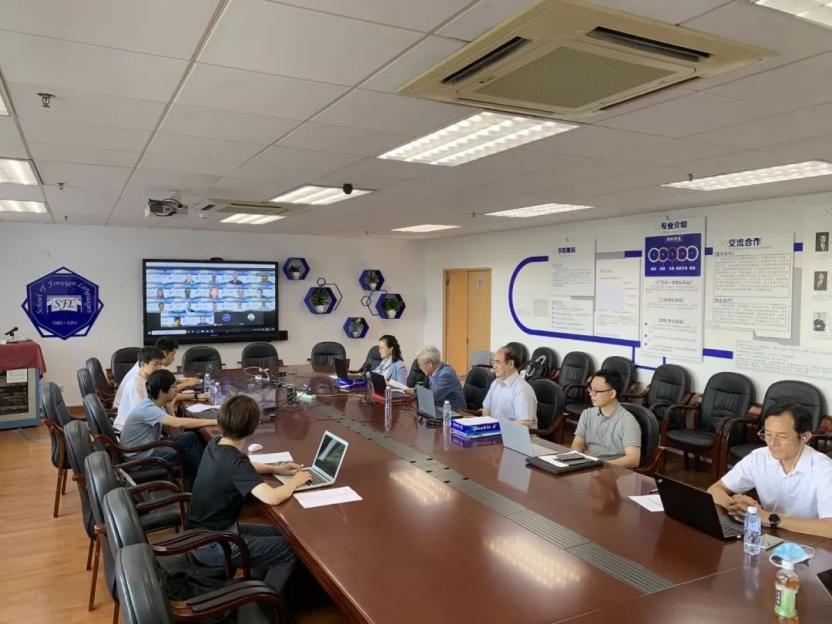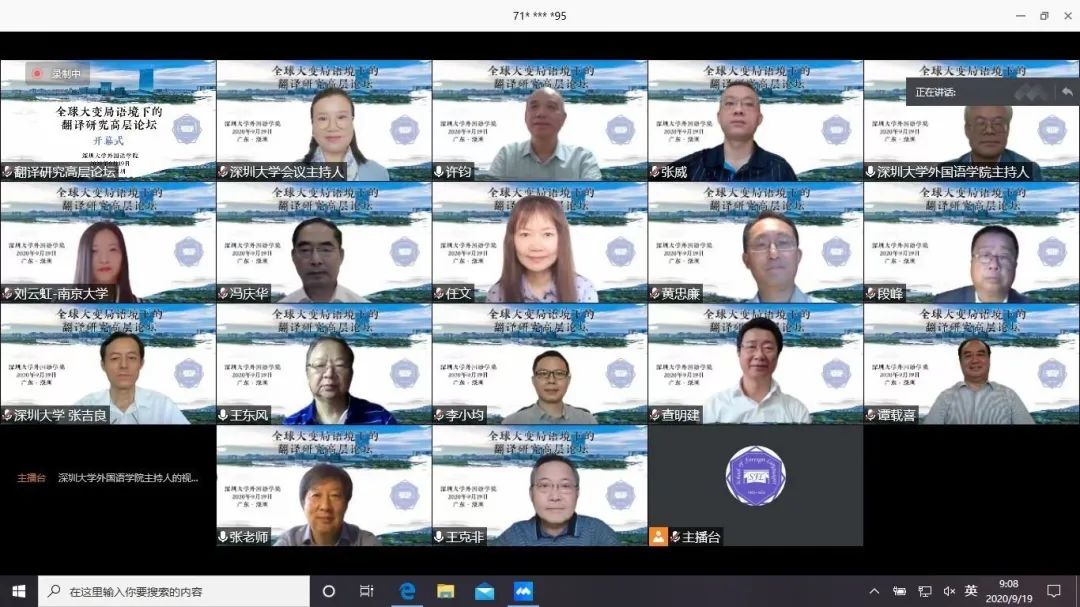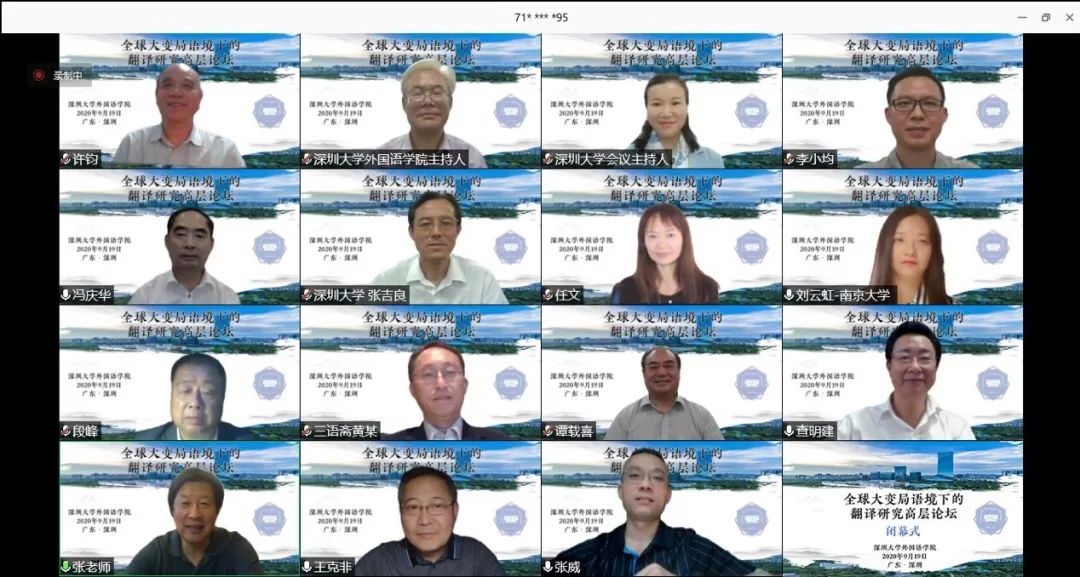"The Forum on Translation Studies in the Context of Global Change" is successfully held
On September 19, 2020, the School of Foreign Languages of Shenzhen University successfully held "the Forum on Translation Studies in the Context of Global Change" in the form of a physical conference combined with a live video streaming. The forum invited 11 top scholars and young talents from the discipline of translation studies to make reports on specific topics. The conference was watched live in real-time by nearly 7,000 audiences. At 9: 00 a.m., the translation forum was opened in the conference room 1200 at the Liberal Arts Building of Shenzhen University and also through the Tencent Live platform.
The opening ceremony was presided over by Cai Xinle, distinguished professor of the School of Foreign Languages of Shenzhen University, and Professor Zhang Xiaohong, dean of the School of Foreign Languages, delivered a welcome speech. Prof. Zhang said that Shenzhen University and Shenzhen Special Economic Zone are bounded for common prosperity. Since the founding of the university 37 years ago, it has been struggling in the wave of reform to develop rapidly with its mode on the way to becoming a world's first-class university.Since the forty years of reform and opening up, Chinese translation studies has gone through rapid development. As an important carrier for connecting the world, promoting cross-cultural exchanges, and serving the national strategy, translation has been given a new historical mission and responsibility. Professor Tan Zaixi, Professor Li Xiaojun, and Professor Zhang Jiliang of the School of Foreign Languages of Shenzhen University attended the meeting.Participants from the School of Foreign Languages of Shenzhen University at the conference room of SFL.

(Offline participants at the conference room, School of Foreign Languages, Shenzhen University)

(Snapshot of the guests and hosts at the opening ceremony of the forum)
The speech session of the forum was kicked off by Professor Wang Kefei of Beijing Foreign Studies University.In the face of the global outbreak of the Novel Coronavirus epidemic, which brings about the situation of Global Change, Professor Wang discussed how cross-language and cross-cultural translation should respond and expand.From the perspective of the digital age and remote translation, he first looked forward to the prospects of the translation industry, and then discussed the advantages and disadvantages of machine translation through detailed and interesting examples of Chinese-English translations.
Professor Wang believes that translation as a necessary channel for cultural communication will still make a lot of difference in the context of machine translation amid the global change. His judgment on the current situation of translation and translation research is objective and accurate, and his opinions on translation research and the training of translation talents are of great significance for the future development of the discipline.
Professor Feng Qinghua of Shanghai Foreign Studies University focuses on the research methods of foreign language literature and translation in the age of intelligence. Professor Feng expounded on the development and use of some English corpus, and through using a large number of examples, he explained how to use a corpus as a tool to assist research problems. Additionally, Professor Feng also explained and discussed how to build a corpus for self-use purposes and how to explore the language characteristics of Chinese and English texts through statistical software.
Professor Zha Mingjian from Shanghai Foreign Studies University identified from the research trend brought about by the "cultural turn" that there is a weak or lack of awareness for the problems existed in the current research of translated literature. He believes that researchers should explore ways beyond the "cultural turn" through combining problem consciousness with research methods, and integrating ideological and academic research. Not only should they turn to the target culture in the research perspective, but also they should probe into the internal part of the target culture in the exploration of problems, find the in-depth problems, and achieve the transformation from research methods to deep academic and ideological pursuit. Professor Zha's speech is instructive for scholars and students engaged in translation research.
Professor Huang Zhonglian of Guangdong University of Foreign Studies and Professor Wang Dongfeng of Sun Yat-sen University focus on literary translation. Professor Huang compared Chinese-English translation cases from the lexical and syntactic levels and explained to the audiences how to use literary means in translation to reconstruct the literariness of the original text. Starting from the poetics function of the original text, Professor Wang stressed the dominance, decisiveness, and importance of this language art, and interpreted the method and meaning of poetics translation through the application of translation. The literary nature explained by Prof. Huang and the beauty of poetics by Prof. Wang complemented each other. With deep insight into the connotations of literary translation, they contribute to the study of literary translation from the philosophical aspect and guide the road for the practice of literary translation.
Professor Zhang Wei of Beijing Foreign Studies University focuses on the construction of Chinese translation practice and research uniqueness. He believes that in the context of the new era, the academic community needs to carefully discuss the meaning of translation theory and thought of "Chinese characteristics", promote the translation and dissemination of the Chinese culture, expand the width and depth for the expression of the Chinese language in the international community and meanwhile actively exploring the training of the translation talents amid the backdrop of modern techniques. In this way, we can continue to expand the international influence of Chinese translation.
Professor Ren Wen of Beijing Foreign Studies University gave an in-depth and innovative discussion on interpretation activities from a sociological point of view. By using Bourdieu's theory of social practice as an analytical tool, she examined the evolution of Chinese interpretation ethics since 1949. She explores the perception and application of ethics by interpreters in mainland China in three stages, revealing the interaction between the changes at different stages and the process for the professionalization of interpretation.
In his speech, Professor Duan Feng of Sichuan University used Zhang Ailing's "Golden Lock" as a case study to analyze the history, society, and motivation of translators in literary self-translation events. He pointed out that Zhang Ailing conveyed the sense of identity, trauma, and dilemma contained in the original work through self-translation and rewriting of her Golden Lock from Chinese into English. In this way, the Golden Lock with a specific meaning and an individual family narrative was expanded into a work with universal meanings that cares about the destiny of human beings.
Professor Zhang Zheng of Beijing Normal University, starting from the concept of translation technology, analyzed the characteristics of technology humanization and human technicalization respectively. By comparing the relationship between man and technology in traditional and modern translation technology models, Professor Zhang analyzed the values and human behaviors reflected by these different models. His speech provides useful thinking for constructing a relationship model of human-machine interdependence and conjugate symbiosis.
Professor Liu Yunhong of Nanjing University cares for the most active but most easily forgotten groups of translators in translation activities, emphasizing the value of re-understanding the presence of translators. Professor Liu took Noël Dutrait, the French translator and sinologist, as an example to examine his translation practice and experience in Chinese literature. By exploring the uniqueness of Dutrait as a translator, she expounded on the universal significance of her example to the foreign translation of Chinese literature and explored the possible path of research on translators.
After the speech of ten scholars, Mr. Xu Jun, a senior professor of liberal arts at Zhejiang University, made a wonderful finale speech for the forum. Professor Xu first affirmed the development of the School of Foreign Languages of Shenzhen University in recent years, and then he gave in-depth reflections on the relationship between translation research and the construction of foreign languages in the new period. Prof. Xu's speech gave guidance for the construction and development of the translation discipline. He pointed out that the initial heart and mission of translation scholars is to work together to enhance the social, academic, cultural, and international influence of the translation discipline.
Professors Tan Zaixi, Li Xiaojun, Zhang Jiliang, and Cai Xinle presided over four time-period keynote reports. Their funny and to-the-point comments formed an interesting cloud academic interaction and resonance with the guests. After the end of the guest speech, the forum held a closing ceremony. The closing ceremony was presided over by Prof. Zhang Xiaohong. Professor Cai Xinle made academic comments and concluding remarks. Professor Cai summarized and commented on the keynote speeches of the 11 guests one by one, highly condensed the main points of the keynote speeches, and made a wonderful and profound academic reflection.At the same time, he passionately expressed his inspiration as an audience.
Prof. Zhang Xiaohong gave a short and affectionate closing speech. She said Shenzhen has transformed from a small fishing village by the Bay to an international metropolis as a strong inferior wave in the past 40 years. As an inferior wave of China's higher education, Shenzhen University has never stopped rushing forward in the past 37 years. We believe that the small spray of the School of Foreign Languages will also bloom beautifully in the era of constructing the Dual Zone and the high-level universities!

(Snapshot of the participants and hosts at the forum closing ceremony)
